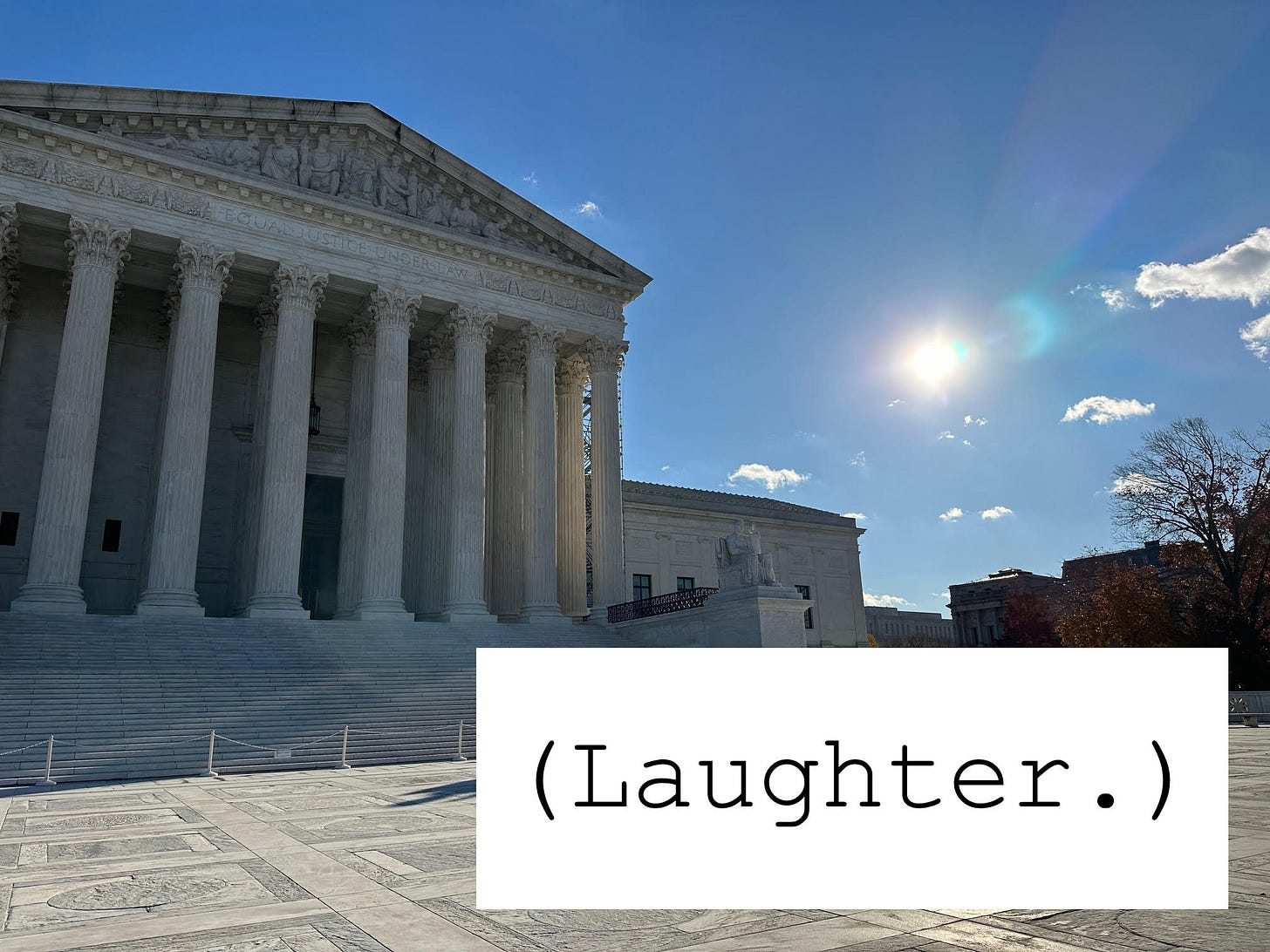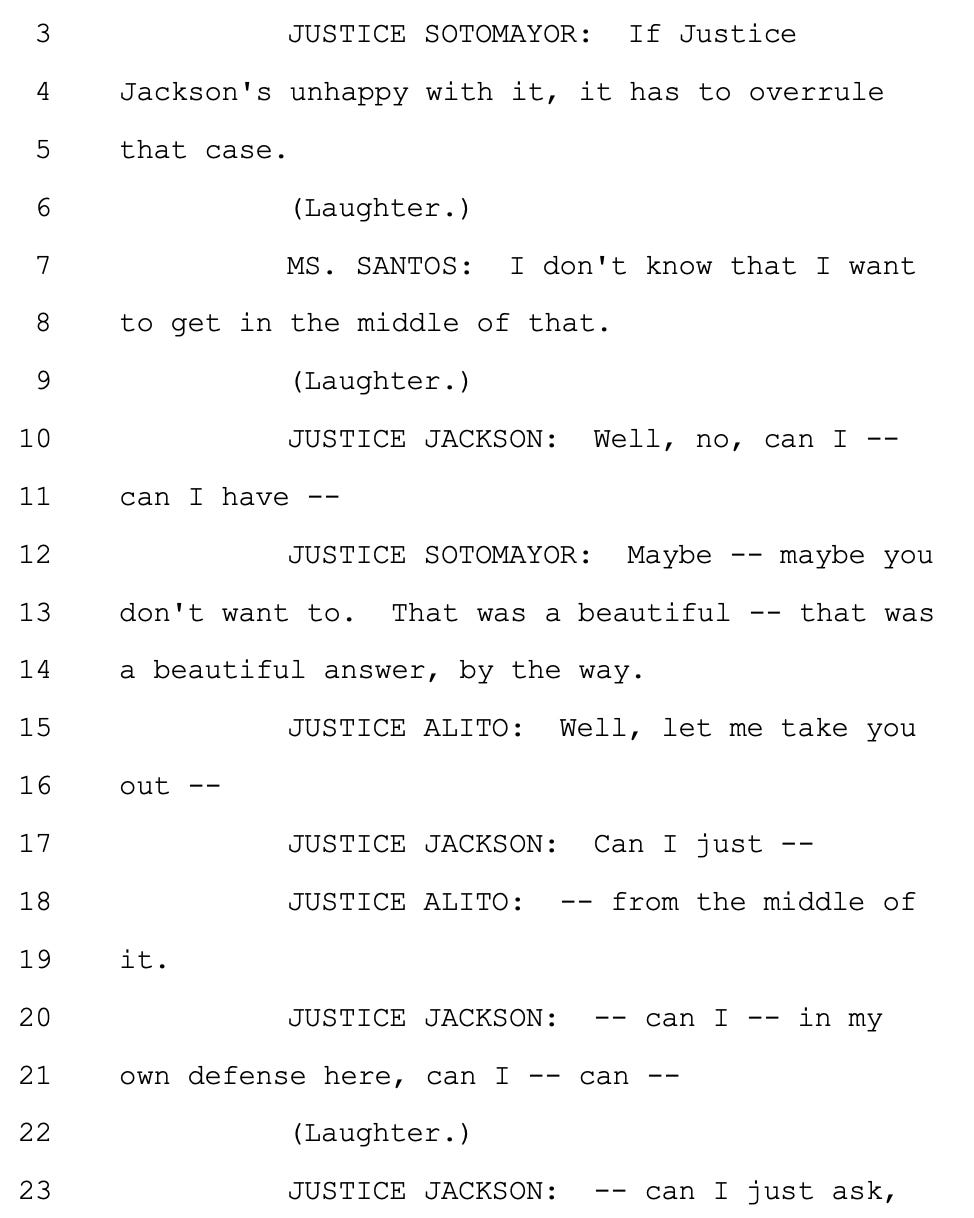An unusually high-spirited day at the Supreme Court. (Laughter.)
In cases over the Double Jeopardy Clause and review of deportation decisions, Georgia and DOJ are likely to lose. But also, a possibility of something more.
The justices of the Supreme Court had a good Thanksgiving. Or something. I don’t know what it was, but the nine members of the Supreme Court of the United States have not been in such a publicly collegial mood throughout a morning of arguments that I can remember.
They were, simply put, in good spirits.
Even when differing on points, there was a level of camaraderie on the bench that has not typified oral arguments in recent years. There were jokes — from Justice Sam Alito even!1 — and genuine laughter — not just the “well, aren’t we witty lawyers” chuckles that typify the “(Laughter.)” moments recognized on oral argument transcripts.
Throughout the two cases heard on Tuesday, justices were leaning over to chat with one another constantly. Sure, that happens, but it was so regular on Tuesday — and among almost all of the justices — that it was disarming. It also came across in the more casual way the justices addressed — talked with(?) — the lawyers before them.
In all, it felt like a different courtroom on Tuesday.
Now, one day does not a changed court make. And, perhaps the lighthearted nature of the day was in part because the outcome in both cases is pretty clear. But, it is notable to see the justices engaging with one another in a way that suggests, bluntly, a friendliness that has not been as publicly apparent in quite some time.
I’m watching it closely not because I like jokes (although, sure, I do). I’m watching to see if there are substantive spillover effects.
Does “(Laughter.)” lead to more?
Double jeopardy
On Tuesday, this all took place first in a case over whether the Double Jeopardy Clause prevents Georgia from allowing a person to be retried after a jury found him “not guilty by reason of insanity.” Ordinarily, the answer would be no. Here, though, the jury also found Damian McElrath guilty on other charges based on the same actions — and, as part of that, they did not find him to be insane as to those charges. The Georgia Supreme Court held the verdicts are void because they are “repugnant,” by which the state means they are logically incoherent.
In the past, the rule in such a situation in Georgia had been that the person could be retried on the charges on which they were found guilty, but that the acquittal prevented retrial on those charges. In McElrath’s case, however, the Georgia high court ruled that the repugnancy meant, in essence, that there had never been a verdict at all and McElrath could be retried on all charges.
The Double Jeopardy Clause prevents that, the justices appeared ready to rule after oral arguments in the case.
Georgia Solicitor General Stephen Petrany, defending the effort, did not have an easy time Tuesday. After Justice Clarence Thomas had already started off the questioning rather aggressively, Justice Neil Gorsuch noted, “I didn't see another state that has a scheme like Georgia's that allows an acquittal to be rendered invalid based on its repugnancy with other guilty verdicts,” and asked Petrany, “Is that correct?”
Petrany responded, “As far as I'm aware, there's no state that has addressed this particular issue, Your Honor,” calling these “rare circumstances” and reiterating that he simply believed that “no other state … has addressed this issue at all.”
To that, Gorsuch retorted, “Now shouldn't that tell us something?”
(Laughter.)
After that, Gorsuch continued:
That 230 years in this country's history, we have respected acquittals without looking into their substance and without looking into how they fit with other counts and said a jury is a check on judges, it's a check on prosecutors, it's a check on overreach, it's part of our democratic system, and we do not ever talk about whether they make sense to us.
They may be products of compromise. They may be inconsistent with verdicts on other counts. We don't question them. And this is the first time this issue has arisen here. Shouldn't that tell us something?
And, so it went.
As Gorsuch, who I have to imagine will be writing the decision, said later, “And so I guess Justice [Brett] Kavanaugh and I think Justice [Elena] Kagan have put their finger on it. The minute you admit that [the jury’s “repugnant” verdicts] could be a product of leniency or compromise, we're done, aren't we?”
By time Petrany sat down, it was clear the justices were done. Georgia’s outlier overreach will not stand.
Deportation decisions
The second oral argument of the day Tuesday featured another government lawyer on defense. This time, though, it was the Department of Justice and its effort — advanced by Assistant to the Solicitor General Colleen Sinzdak — to prevent courts from reviewing certain decisions of immigration judges and the Board of Immigration Appeals (both of which are within the Department of Justice, not independent courts).
The case, brought by Situ Wilkinson, is about the decision the agency makes regarding whether an individual immigrant’s situation meets the statutory requirements for a cancellation of removal — preventing the person’s deportation. The standard at issue in Wilkinson’s case is whether the person can show that removal would cause “exceptional and extremely unusual hardship.” The question before the justices is whether that agency decision creates a “mixed question of law and fact” that courts can review or is a purely discretionary decision that is unreviewable by the courts.
Unsurprisingly, courts don’t tend to give up the power to review agency decisions, and the Supreme Court did not appear interested in doing so any more than Congress has required here.
As Justice Sonia Sotamayor said at one point later in the arguments:
Justice [Amy Coney] Barrett points out that the cases are rare, but they still exist, meaning that's why we have judicial review. It's rare that federal convictions are overturned. I think it's probably 5 percent or it was a very low number of federal convictions were ever overturned, yet we still permit review of them.
We permit review not for the majority of cases. We permit review for the exceptions.
That was, it appeared, the view that commanded a majority of the court.
This was a less clear-cut decision, however, with Justice Ketanji Brown Jackson joining Alito and Thomas in skeptical questioning of Wilkinson’s lawyer, Jaime Santos.
Focused on the congressional limits set on judicial review in this context, Jackson asked, “[C]an't we say … that really Congress wanted the agency to be the one to do that kind of comparison and not the Court?“
Although it appeared Jackson was more frustrated with the court’s past rulings in this area — at one point noting that she wasn’t on the Supreme Court when a key case had been decided in 2020 — than Santos or her client, Jackson’s view appeared pretty clearly to be in the minority on Tuesday.
(Laughter.)
Jackson did go on to speak in her defense, asking about the nuances of mixed questions of law and fact. Santos answered ably. The morning wore on. Sinzdak took the podium. The clock struck noon. Less of a fun time for Sinzdak, but the justices were full of bonhomie, with Gorsuch and Barrett laughing with one another after Gorsuch mentioned a recent case in this area in which Barrett wrote the majority and Gorsuch, who sits next to her in the courtroom, wrote the dissent. “You won,” he exclaimed to laughter, noting, “I’m working with it.”
On Tuesday, they appeared to be working on the same side, going back and forth questioning Sinzdak about the “guardrails” provided by deferential judicial review of agency decisions — and at one point shaking their heads “no” in unison in response to her unsatisfactory answer.
Looking ahead
Let’s leave no doubt here: The Supreme Court remains extremely conservative and undoubtedly will prove that in many decisions this term. The issues are serious and jokes and laughter wouldn’t blunt decisions that cause harm.
Outside interests on the right — extremist appeals court judges, far-right state attorneys general, the Federalist Society and other aligned groups, the Alliance Defending Freedom, the Chamber of Commerce and other business interests, and so on — will continually be seeking to push the court and its decisions further to the right.
Efforts to dull the sharp edges of that project, let alone to stop those efforts altogether, are going to continue to be difficult for the trio of Democratic appointees to accomplish given their numbers on the high court.
But, is it possible that attention on the court — criticism of the court — is having an effect?
It’s for that reason that I found Tuesday’s arguments so interesting. I want to see where this goes.
I couldn’t help but think, watching the justices on Tuesday, about whether a more collegial court could open the path to more compromise. Whether the public accountability the court has faced has led to an opening from more of the justices to seek collegiality and compromise.
That’s not, of course, to say that those efforts haven’t already been going on inside the court and behind the scenes. It was just so front and center in an unusually public way on Tuesday that I’m sitting with it this evening.
And while progressives outside the court will continue seeking more significant changes, openings for compromise are — at least in the short term — a key way for Sotomayor, Kagan, and Jackson to advance progressive interests inside the court.






Be very careful, Mr Geidner: this is how they lure you in, with jokes and seeming goodwill.
Well, let us see how much "bonhomie" lingers as the Justices hear Moore v United States...rubber meets the road, and all that.